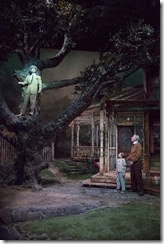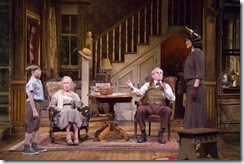Reading or, in this case, watching a fable requires that we suspend our disbelief, so I suggest you leave yours at the door of the Rechnitz Theater when you attend the revival of On Borrowed Time, a play that premiered in 1938 and is now being produced at the Two River Theater Company to begin it 20th year of performance. The story is a variation on a tale going back to the ancient Greeks: A human being (think: Orpheus, Alcestis) attempts to stave off the efforts of Death to take a loved one.
Playwright Paul Osborn, adapting a novel by Lawrence Edward Watkin, sets the familiar story in small-town America, to the Northrup family residence to be exact, to address the grand themes of the transitory quality of time, the preciousness of Life and the redeeming, eternal power of Love. The result is a charming production of a little known play that manages to, in its own quiet way, challenge us to consider our relationships with our loved ones and remind us that we are all living "on borrowed time."
Just as a huge apple tree (below right) looms over the Northrup homestead, so Death (in the form of his emissary Mr. Brink) is ominously present throughout On Borrowed Time. And he's busy, too, taking away Pud's beloved mother and father in an automobile accident and ailing grandmother before the first act is even completed. Dressed in a light suit, shoes and hat, the pale Brink, played soberly and with quiet menace by a stern-faced Tom Nelis, appears silently and without warning, intent on doing his job.
 He meets his match in genial yet steely Julian Northrup, a senior citizen given to cussing and outspoken criticism of those he can't stand (especially the self-righteous Demetria Riffle, who he calls a pismire—an especially mean ant), but whose relationship with his grandson Pud is warm and loving. When the orphaned Pud, heir to a $15,000 inheritance (a grand sum for the 1930s), is about to be "adopted" by Pud's covetous Aunt Demetria, Julian goes into high dudgeon—so worked up is he that when Mr. Brink comes to take him to the Great Beyond ("Hell," as Pud says), he "casts a spell" on the man, stranding him in the apple tree and thus rendering him powerless. The only way anyone or anything can die is if they touch Mr. Brink or the apple tree. [Above: Tom Nelis (Mr. Brink, in tree), Oakes Fegley (Pud), and Robert Hogan (Gramps)]
He meets his match in genial yet steely Julian Northrup, a senior citizen given to cussing and outspoken criticism of those he can't stand (especially the self-righteous Demetria Riffle, who he calls a pismire—an especially mean ant), but whose relationship with his grandson Pud is warm and loving. When the orphaned Pud, heir to a $15,000 inheritance (a grand sum for the 1930s), is about to be "adopted" by Pud's covetous Aunt Demetria, Julian goes into high dudgeon—so worked up is he that when Mr. Brink comes to take him to the Great Beyond ("Hell," as Pud says), he "casts a spell" on the man, stranding him in the apple tree and thus rendering him powerless. The only way anyone or anything can die is if they touch Mr. Brink or the apple tree. [Above: Tom Nelis (Mr. Brink, in tree), Oakes Fegley (Pud), and Robert Hogan (Gramps)]
Because no one but Julian (and Pud) can see or converse with Brink, Demetria plots to have the old man committed to the county insane asylum; Dr. Evans attempts to reason with Julian to reverse the spell lest the world become overcrowded and sick people linger painfully past their time. He almost convinces Julian that we "need" death, but it is Pud who finally brings the stand-off to a sad but satisfying dénouement.
The marvelous set, designed by Michael Carnahan, plays as much of a character in the play as do the actors. The huge tree (sturdy enough to be climbed by child and adult alike) provides shade (and apples) to the lovely house, complete with working screen doors and a homey living room. It draws us into the story and sets the mellow, often menacing, mood against which the action unfolds.
 Joel Grey, who played Pud in the 1941 revival at the Cleveland Playhouse, uses a light touch to direct this magical fantasy. Plenty of humor and an aura of love surround the characters—well, most of them, anyway! Robert Hogan as Julian Northrup ("Gramps") and Oakes Fegley as John Gilford Northrup (Pud) are quite an attractive pair; their chemistry is so strong and convincing that it is easy to believe that they are grandfather and grandson. Hogan's cussing, objectionable to early audiences, is mild by today's standards, but when Pud uses the words, we are reminded that the old are role models for the young. Fegley's performance is remarkable for an eight-year-old; he never forgets a line, although he could speak a bit louder (no one is miked in this intimate theater) at times, especially when his back is turned to the audience. He recites the childlike dialogue with an easy assurance; Hogan's Gramps never "corrects" the child or teases him about his mispronunciations ("coffing" for coffin). They are quite a credible familial pair, these two. [Above left: Oakes Fegley (Pud) and Robert Hogan (Gramps)]
Joel Grey, who played Pud in the 1941 revival at the Cleveland Playhouse, uses a light touch to direct this magical fantasy. Plenty of humor and an aura of love surround the characters—well, most of them, anyway! Robert Hogan as Julian Northrup ("Gramps") and Oakes Fegley as John Gilford Northrup (Pud) are quite an attractive pair; their chemistry is so strong and convincing that it is easy to believe that they are grandfather and grandson. Hogan's cussing, objectionable to early audiences, is mild by today's standards, but when Pud uses the words, we are reminded that the old are role models for the young. Fegley's performance is remarkable for an eight-year-old; he never forgets a line, although he could speak a bit louder (no one is miked in this intimate theater) at times, especially when his back is turned to the audience. He recites the childlike dialogue with an easy assurance; Hogan's Gramps never "corrects" the child or teases him about his mispronunciations ("coffing" for coffin). They are quite a credible familial pair, these two. [Above left: Oakes Fegley (Pud) and Robert Hogan (Gramps)]
 Their antagonist, the formidable Demetria, is played with suitable odiousness by Angela Reed. A sanctimonious "good Christian" woman, she automatically thinks the worst of people and condemns them for the slightest missteps. When she learns of Pud's inheritance, her acquisitiveness is manifest; she runs roughshod over Gramps and isn't above playing a devious trick on him to get to the boy. Diane Kagan's Miss Nellie, Julian's wife, is a fragile wisp of an old woman, well meaning but inept. It was difficult to hear her too, from time to time, although her soft voice fit her failing health. As the young housemaid Marcia Giles, Betsy Hogg is winning and winsome; she comes to Julian's rescue without blinking an eye. Steve Skybell plays Dr. Evan with a concerned air; Patrick Husted is the epitome of exasperation as lawyer Pilbeam; and Brian Michael Hoffman is a cunning, rather malevolent, Mr. Grimes, superintendent of the insane asylum, eager to do Demetria's bidding. [Above L-R: Oakes Fegley (Pud), Diane Kagan (Miss Nellie), Robert Hogan (Gramps), and Angela Reed (Demetria Riffle)]
Their antagonist, the formidable Demetria, is played with suitable odiousness by Angela Reed. A sanctimonious "good Christian" woman, she automatically thinks the worst of people and condemns them for the slightest missteps. When she learns of Pud's inheritance, her acquisitiveness is manifest; she runs roughshod over Gramps and isn't above playing a devious trick on him to get to the boy. Diane Kagan's Miss Nellie, Julian's wife, is a fragile wisp of an old woman, well meaning but inept. It was difficult to hear her too, from time to time, although her soft voice fit her failing health. As the young housemaid Marcia Giles, Betsy Hogg is winning and winsome; she comes to Julian's rescue without blinking an eye. Steve Skybell plays Dr. Evan with a concerned air; Patrick Husted is the epitome of exasperation as lawyer Pilbeam; and Brian Michael Hoffman is a cunning, rather malevolent, Mr. Grimes, superintendent of the insane asylum, eager to do Demetria's bidding. [Above L-R: Oakes Fegley (Pud), Diane Kagan (Miss Nellie), Robert Hogan (Gramps), and Angela Reed (Demetria Riffle)]
Costumes by Ann Hould-Ward fit the time and place, with Demetria wearing a no-nonsense suit and hat, and Julian a tie and sweater. Jennifer Tipton's lighting is atmospheric and shows the passage of time, and Nathan A. Roberts has provided clashing sounds and sentimental music fitting to the plot. The song, "Just a Song at Twilight," perfect renders the passage of time.
Unfortunately, recent mass shootings and casualties of war have reminded us of the tenuousness of life. Julian and Nellie are ready for death, but Pud and his parents are not. Nonetheless, their time is "up" and nothing can prevent their demise. The sweet closing moments of On Borrowed Time reveal that death does not have to be an ending, but can be a new beginning.
On Borrowed Time, scheduled to end October 6, has been extended for another week, through October 13, at Two River Theater Company’s Rechnitz Theater, 21 Bridge Avenue in Red Bank. For performance and ticket information, call the box office at 732.345.1400 or visit www.tworivertheater.org.
All Photos by T. Charles Erickson
